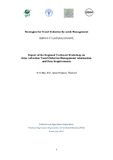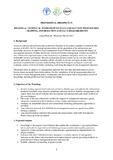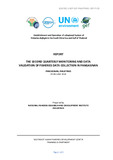Report of the Regional Technical Workshop on Data Collection Trawl Fisheries Management Information and Data Requirements 8‐11 May 2013, Samut Prakarn, Thailand
นามธรรม
The Coral Triangle region of Southeast Asia is one of the world’s most biologically diverse, economically productive but potentially vulnerable marine zones. As a result of increasing populations and exploitation pressures, growing threats from pollution and major ecosystem changes are a particular concern in the region. In the global and regional context, the untargeted capture of fish and non‐fish species, commonly called by catch and discards, is an increasing concern. By catch includes fish, turtles, marine mammals, and corals and other seabed fauna and flora. This part of the catch tends to be poorly monitored and unmanaged but could be having an important impact on fishery resources, habitats and ecosystems. In some fisheries and regions, there is an increasing trend towards retention of the by catch consisting of juveniles and small sized fish for use as food for human consumption or for utilization as feed in aquaculture or livestock rearing. This is therefore a complex issue, requiring resource and biodiversity aspects to be tackled alongside human needs and involving a mix of policy, technical and community support measures.
The project; Strategies for trawl fisheries by catch management (REBYC‐II CTI) is contributing to the more sustainable use of fisheries resources and healthier marine ecosystems in the Coral Triangle and Southeast Asia waters by reducing by catch, discards and fishing impacts from trawl fisheries. The Project is being executed by the Southeast Asian Fisheries Development Center (SEAFDEC), based in Bangkok, Thailand, and the governments of Indonesia, Papua New Guinea, Philippines, Thailand and Viet Nam, in partnership with the private sector and other relevant national, regional and international organizations. The Food and Agriculture Organization of the United Nations (FAO) is the Global Environment Facility (GEF) agency for the project. The project began in May 2011 and will run for four years. The total budget is USD 11,218,600. Based on the principles of the FAO Code of Conduct for Responsible Fisheries (1995) and the Ecosystem Approach to Fisheries (EAF), the project is building on the successes of the 2002‐2008 FAO/UNEP /GEF global project “Reduction of Environmental Impact from Tropical Shrimp Trawling through the Introduction of By catch Reduction Technologies and Change of Management”. The Project focuses on multi‐species bottom trawling, where by catch issues and the effects on ecosystems and livelihoods are considered significant. The project is addressing these challenges by promoting sustainable fishing practices and improved trawl management.
การอ้างอิง
(2013). Report of the Regional Technical Workshop on Data Collection Trawl Fisheries Management Information and Data Requirements. Training Department, Southeast Asian Fisheries Development Center.
เรื่อง
คอลเลกชัน
- Report Activities [22]
รายการที่เกี่ยวข้อง
แสดงรายการที่เกี่ยวข้องตามชื่อผู้แต่งผู้สร้างและเรื่อง
-
Report of the Regional Technical Workshop on Data Collection Trawl Fisheries Management Information and Data Requirements
Fisheries and Aquaculture Department Food and Agriculture Organisation of the United Nations (FAO) (2013-04-08)The Coral Triangle region of Southeast Asia is one of the world’s most biologically diverse, economically productive but potentially vulnerable marine zones. As a result of increasing populations and exploitation pressures, ... -
Regional Technical Workshop on Data Collection Procedures – Mapping, Information and Data Requirements SamutPrakarn, Thailand, March 2013
SEAFDEC; FAO; REBYC-II CTI (2013-03)Access to relevant and sufficient data on the trawl fisheries in the partner countries is critical for the success of REBYC-II CTI. Appropriate data allows for the generation of the information and knowledge necessary to ... -
Report of The Second Quarterly Monitoring and Data Validation of Fisheries Data Collection in Pangasinan
NFRDI/Philippines (SEAFDEC/TRAINING DEPPARTMENT, 2018-06)The Second Quarterly Monitoring and Data Validation of Fisheries Data Collection in Pangasinan was conducted by The National Fisheries Research and Development Institute, at Pangasinan, on 5-8 June 2018. The survey aimed ...




